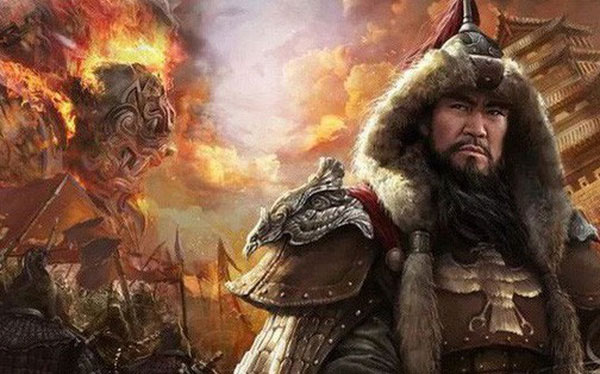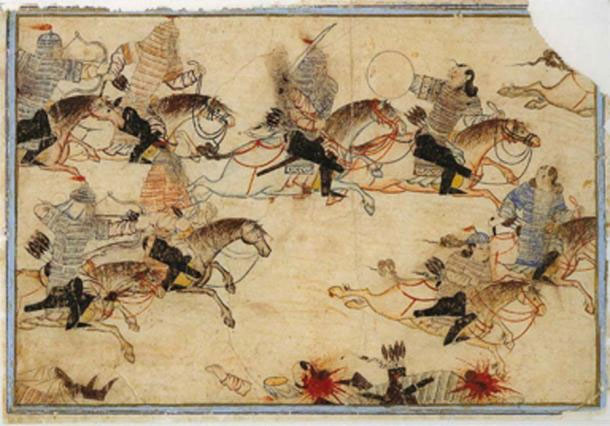Tiny animals banish the Mongolian army, save Europe from destruction?
The Mongol Empire was once the largest dominant empire in the world, but the Mongols could never occupy Europe even though the early campaigns created a 'victory like splitting bamboo'.
In the 13th century, the Mongols, with a mighty spirit, intended to conquer the whole of Europe. This made European countries trembled by the potential of the Mongols.

Genghis Khan died before he could open a campaign to conquer Europe.
The rise of Genghis Khan
Genghis Khan, whose real name is Thiet Moc Chan, experienced a very difficult childhood. The father was poisoned by neighboring tribes, so Genghis Khan's family lost all power, had to live a difficult nomadic life.
In 1182, Genghis Khan was captured by his former tribesmen and people in an ambush and imprisoned with a gong on his neck and was lucky to escape only by the guards. During this time, the mother taught Genghis Khan a variety of things, from surviving in Mongolia's severe weather conditions to the need for an alliance with others. Genghis Khan has since kept in mind the thought of the unification of Mongolian tribes.
In an effort to unite the factions, Genghis Khan broke the tradition of the Mongols. Instead of killing enemies or making them slaves, Genghis Khan committed to protecting and persuading them to participate in future conquests. Genghis Khan is also willing to value talented people, with loyalty and acumen, rather than favoring members of clans and families.
It was the different ideas at that time that helped Genghis Khan's alliance grow steadily. As a result, in 1206, Genghis Khan unified completely the Mongol tribes, making the premise to form the largest empire in the world history.

The climate was different and infectious diseases prevented the Mongol army.
By 1220, the Mongol empire stretched from the Korean peninsula to the Changjiang River in China in the south and the Himalayas, and the banks of the Euphrates River (present-day Syria) in the west. The Mongols had long since mastered the lightning offensive tactics that Nazi later applied. The stubborn enemies who resisted were surrounded until they were exhausted.
Genghis Khan immediately divided his army into two. The main army commanded by Genghis Khan defeated Afghanistan and northern India to return to the Mongolian steppe. The remaining army of about 30,000 commanded by Jebe and Zhai Dai Dai, marched through the Caucasus and into Russia, attacking deep into Armenia and Azerbaijan.
Genghis Khan then sent a small army to scout Poland and Hungary with the ambition to march west, into Europe. This army soon withdrew to Mongolia in 1223.
It is not clear why the decision to invade Europe was canceled. Historians say the Mongols were invincible to other troops, but were helpless when attacked by malaria-carrying mosquitoes , especially the army stationed in the Caucasus and along the Black Sea.
At that time, Genghis Khan himself also suffered from chronic malaria. Later historians most likely agreed that Genghis Khan died in 1227 at the age of 65, due to various illnesses caused by the weakened immune system since malaria.
Genghis Khan's resting place remains a mystery to this day. The Mongols at that time did not seriously assess the threat associated with malaria, even though the empire when Genghis Khan died was still very strong.
European conquest and defeat
After Genghis Khan passed away, his son Oa Khoat Dai took power, launching a campaign to invade Europe from 1236-1242. The Mongol army took its route east of Russia, occupied the Baltic states, and headed to Budapest, Hungary and the Danube in December 12,241. From Budapest, the Mongols advanced deep into Austria and struck south, but finally returned east in the Balkans in 1242.

The Mongolian army had once advanced to the Danube but then withdrew.
The Mongol army retreated when Oa Khoat Dai died suddenly, no more generals still mind to go further west.
The late British Prime Minister Winston Churchill once wrote: 'There was a time when it seemed that all of Europe would fall into the hands of the Mongols from the East. The Mongolian army of horses, archers competed in Russia, Poland and Hungary in 1241. They defeated the Germans and the European cavalry near Buda and abruptly retreated, Western Europe was fortunate to escape. '
The weakness of the Mongols is that they cannot adapt to areas with hot and humid climates, with mosquitoes raging . Heavy rains make the Magyar grasslands of eastern Europe a swampy land, like a paradise for malaria-transmitting mosquitoes. It was the mosquitoes that helped prevent the Mongols from flooding the West , "drying up" their dream of conquering Europe.
Although the Mongols had some limited success during the invasion of Europe, they were repeatedly forced to retreat in the face of malaria, other illnesses, and strong defenses of the Intelligent European countries. The Mongols did not pay much attention to scientific research and research, could only live on nature, could not prevent the breeding of mosquitoes.
The historian John Keegan, who has studied Mongolia for many years, said: 'The Mongols have failed to bring military power from the semi-temperate and desert regions to the rainy regions of Europe and they had to accept defeat '.
Until the end of the Mongol Empire in 1368, mosquitoes and malaria parasites were still mentioned as one of the main causes , apart from the division and civil war among the ranks of Mongolian tribes.
- Barriers to Mongolian horse horses flooded into Europe
- The reason Mongolia became the greatest empire in history
- The gruesome grave reveals the massacre of the Mongol army when attacking Europe
- 13 most powerful military forces in the history of the ancient world
- Shocking revelations about the mighty warrior of Genghis Khan
- Mysteries not everyone knows about the West deck
- Discovered the terracotta army protecting the tomb of Han's son
- Close up of the strange beauty of tiny animals
- 10 species of 'tiny' animals in the world
- Video: The army's ability to kill horrors
- Tiny monkey re-emerged after 86 years
- Video: European zoo animals are bewildered by the flood
 'Fine laughs' - Scary and painful torture in ancient times
'Fine laughs' - Scary and painful torture in ancient times The sequence of numbers 142857 of the Egyptian pyramids is known as the strangest number in the world - Why?
The sequence of numbers 142857 of the Egyptian pyramids is known as the strangest number in the world - Why? History of the iron
History of the iron What is alum?
What is alum?